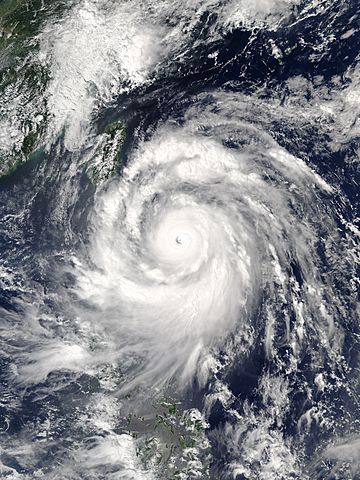Typhoon Meranti facts for kids
| Typhoon (JMA scale) | |
|---|---|
| Category 5 super typhoon (SSHWS) | |

Typhoon Meranti near peak intensity on September 13
|
|
| Formed | September 8, 2016 |
| Dissipated | September 17, 2016 |
| (Extratropical after September 16) | |
| Highest winds | 10-minute sustained: 220 km/h (140 mph) 1-minute sustained: 305 km/h (190 mph) |
| Lowest pressure | 890 hPa (mbar); 26.28 inHg |
| Fatalities | 30 confirmed, 15 missing |
| Damage | $2.61 billion (2016 USD) |
| Areas affected | Philippines, Taiwan, East China, Korean Peninsula |
| Part of the 2016 Pacific typhoon season | |
Typhoon Meranti, also called Typhoon Ferdie in the Philippines, was an incredibly powerful tropical cyclone in 2016. It was one of the strongest storms ever recorded. This massive typhoon hit the Philippines, Taiwan, and mainland China very hard.
Meranti was the strongest typhoon in terms of low pressure since Typhoon Megi in 2010. It also had the highest wind speeds since Typhoon Haiyan in 2013. Overall, it was the strongest tropical cyclone to form anywhere in the world during 2016.
The storm caused a lot of damage, costing more than $2.6 billion. Sadly, it also led to the deaths of over 30 people.
Contents
What is a Tropical Cyclone?
A tropical cyclone is a fast-spinning storm system. It forms over warm ocean waters. These storms have strong winds and heavy rain. They are known by different names around the world. In the Atlantic and Northeast Pacific, they are called hurricanes. In the Northwest Pacific, they are called typhoons. In the South Pacific and Indian Ocean, they are called cyclones.
How Strong Was Typhoon Meranti?
Typhoon Meranti became extremely powerful. It reached its strongest point on September 13, 2016. At this time, its winds were about 280 kilometers per hour (175 miles per hour). The pressure inside the storm dropped to 890 millibars. A lower pressure usually means a stronger storm.
Meranti was so strong that it was like a Category 5 hurricane. This is the highest category on the Saffir–Simpson hurricane wind scale. It means the storm can cause catastrophic damage.
Meranti's Path and Impact
Meranti started as a tropical depression on September 8, 2016. It formed over the Pacific Ocean. It quickly grew stronger as it moved west.
Impact on the Philippines
The typhoon first hit the northern part of the Philippines. It passed directly over Itbayat island. This happened on September 13. The island experienced the full force of the storm. Many homes were damaged or destroyed. Power lines were knocked down. Communication was cut off for a while.
Impact on Taiwan
After the Philippines, Meranti moved towards Taiwan. It passed just south of the island. Even though it didn't make a direct hit, it caused a lot of problems. Strong winds and heavy rain hit southern Taiwan. Trees were uprooted, and buildings were damaged. Many areas lost electricity. Flights and train services were stopped.
Impact on Mainland China
Finally, Typhoon Meranti made landfall in Xiamen, Fujian province, China. This happened on September 15. It was still a very strong typhoon when it hit China. The storm caused widespread flooding. It also damaged many buildings and roads. Power outages affected millions of homes. Rescue efforts were needed to help people trapped by floods.
After the Storm
After hitting China, Meranti quickly weakened. It turned into a tropical depression. By September 17, it had completely disappeared. The areas affected by Meranti began the long process of recovery. People worked to rebuild homes and restore services.
Images for kids
-
Typhoon Meranti passing just south of Taiwan on September 14
See also
 In Spanish: Tifón Meranti para niños
In Spanish: Tifón Meranti para niños
 | Aurelia Browder |
 | Nannie Helen Burroughs |
 | Michelle Alexander |




